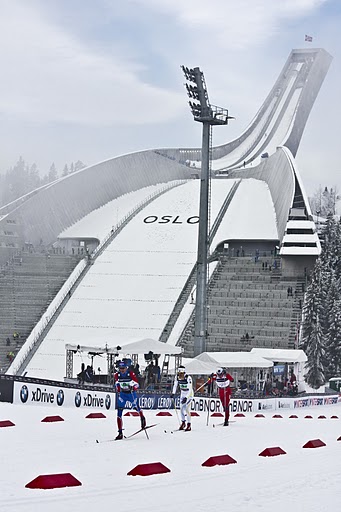A new survey indicates that just 42 percent of Oslo’s residents are now positive towards the prospect of the city organizing the Winter Olympics in 2022. Public support for an Olympics has fallen markedly during the last 20 months.

The survey, conducted by polling firm Respons for newspaper Aftenposten, shows that 33 percent of Oslo residents questioned are negative towards the city’s plans for an Olympics, simply called “OL” among Norwegians. The 42 percent who said they’re positive is down from 58 percent in a similar survey conducted in March 2011.
That was when Oslo was caught up in euphoria over its successful hosting of the Nordic Skiing World Championships at Holmenkollen, and just after Gerhard Heiberg, a Norwegian member of the International Olympic Committee (IOC), had planted the idea of another Winter Olympics in Norway. Heiberg claims Norway has the financial resources and winter sports expertise to carry out a successful “OL” like the one mounted in Lillehammer in 1994, where he played a leading role.
The costs of organizing an Olympics have become enormous, and it’s in the IOC’s interests that wealthy and willing organizers come forward to carry out such an ambitious project. Few countries are as wealthy as Norway, given its oil and gas resources that have pumped up the economy in recent years, so it’s not surprising IOC members like Heiberg would encourage cities like Oslo to bid. Heiberg has even suggested that Norway almost has an obligation to organize an Olympics, at a time when other countries, not least many in Europe, are financially strapped.
The new survey, though, indicates Oslo residents have sobered up since the gold rush of the 2011 world championships, where Norwegian skiers also dominated. In addition to the 33 percent now negative towards the prospect of an “OL” for which they’d be financially responsible, 25 percent are unsure. That leaves them ultimately in a decisive role, since city officials agreed to listen to the public and hold a rare voter referendum on the issue. It’s scheduled to take place in connection with national elections in September.
The OL application process, which city politicians went ahead and approved last summer, may hit a roadblock before then, however, Aftenposten reported on Friday. The launch last month of preliminary plans for what an OL-application committee calls “Games in the City” didn’t set off any major new “Olympic Fever,” given an initial lack-lustre response and, now, the decline in support for an Olympics. The city government must decide in June whether it will apply for a state guarantee to help finance an OL. If they decide against that, given the costs and investment required, the application process will end.
OL plans from the application committee call for a “compact” Olympics that mostly will be carried out within the city limits, with Nordic events back up at Holmenkollen, snowboarding at Tryvann, new skating facilities built in and around Oslo and some surprises, like biathlon events held around the Ekeberg plateau on the city’s east side and freestyle skiing at Grefsenkollen.
Officials still haven’t agreed on whether downhill skiing events will be held back up around Lillehammer, most likely at Kvitfjell, or at Norefjell, closer to Oslo, and no costs have been estimated. Sports officials in communities close to Oslo, meanwhile, have expressed disappointment that not more events were delegated to their areas.
Eli Grimsby, head of the committee working on a potential OL bid, remains optimistic and thinks Oslo has a good chance of winning the games in 2022. She realizes, though, that “we have to have the people behind us,” as she told Aftenposten last week. “We just have to make even more clear what we can inherit from an OL, what we’ll still have when the Games are over,” including, for example, new housing, arenas, improved infrastructure and “”memories that bind a nation together.”
Views and News from Norway/Nina Berglund
Please support our news service. Readers in Norway can use our donor account. Our international readers can click on our “Donate” button:

